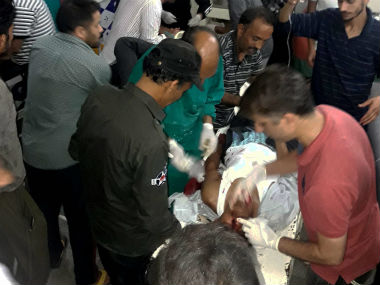It was the year 2001. After a day’s work in town, I was returning to a village about 30 km from Srinagar, where I was staying in those days. I had reached Pandach, a major crossing on the highway, beyond which there was in those days only a single road to Baltal, the new alternate route for the Amarnath Yatra. I remember the scene clearly. A policeman stopped my car, wielding his lathi as if he would hit the car if I tried to pass him. It was almost sunset and he was not going to allow me to move forward. The reason was that I looked like a yatri to him. It was only when I told him ‘ba chus rozan yapari’ (I live here) in Kashmiri that he let me go. [caption id=“attachment_3798887” align=“alignleft” width=“380”] Unregistered pilgrims should have been given more security. PTI[/caption] The point of this story is that no yatra movement is normally allowed after dark, especially in such times of extremely high perception of threat. During the day too, yatris travel with a lot of security. Security blanket In fact, the irony is that many people died tragically on Monday because they were not under security protection. The security forces would not have allowed them to be on the roads at 8.20 pm, well after dark. Like many other yatris over the years, those who have completed the yatra go their own way on the return journey, often spending some time as tourists or just taking in the sights. That is what the victims, who had apparently completed the yatra, were doing. It seems that in another attack at about the same time, terrorists attacked a convoy of security forces, mainly the police. Changed norms This year’s yatra has been more closely guarded than in the past many years. All of them have been asked to take only the southern route, via Pahalgam, and return via the Baltal route. The entire government and all the security forces have been sharply focused on protecting the yatra since it began on 29 June. Tension has been high among them. In any case, relatively few pilgrims have undertaken the yatra this year. Even they have generally avoided spending a few extra days to enjoys the beauties of Kashmir — as most yatris did in the past 15 years or so. According to those who run tourist facilities in the vicinity of the yatra — Sonamarg, for example — speak of empty hotels. Information flow Immediately after the attack, the government responded by imposing a clampdown on information flow from the police. The result was that most of the information came from paramilitary forces and politicians. On behalf of the government, only one high-ranking minister from each of the major coalition partners seemed to have been initially fielded to speak to the media — including Minister of State in the Prime Minister’s Office Jitendra Singh, who hails from Jammu. They focused on the horror of the attack, traditional values, and what they called ‘Kashmiriyat’. The ministers, and other powerful figures who later joined them, did not initially clarify that those who died were not registered as yatris and therefore were not under the security blanket of the forces. Expectedly, the news that yatris had been killed sent shock waves across the country, and exposed both the central and state governments to strong criticism.
The irony is that many people who had gone for Amarnath Yatra died tragically on Monday because they were not under security protection.
David Devadas is an expert on politics and geopolitics. Formerly a Senior Fellow at the Nehru Memorial Museum and Library, Visiting Professor at Jamia Millia Islamia, and Political Editor of Business Standard, he is currently Distinguished Fellow at the Institute for Social Sciences. He has written books on Kashmir, on youth, and on history. He has been a radio compere, guest faculty at JNU's Academic Staff College, St Stephen's College and Hindu College. He has worked for the Indian Express, The Hindustan Times, India Today, The Economic Times and Gulf News. His most impactful article, on a murder cover-up, prevented a Congress President from becoming prime minister. One led to the closure of an airline, and another created a furore and consequent clean-up in Delhi's health department. Several have correctly predicted election results in key states, and a series of reports from Srinagar made the government aware of how unsettled the situation there was in 1990. He is an alumnus of St Xavier's School, St Stephen's College, and the Indian Institute of Mass Communication. He has lived for extended periods in Geneva and Berlin, and has traveled to almost 50 countries. He enjoys various kinds of music, theatre, design, architecture and art. see more


)




